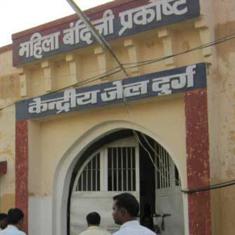Haryana: Yogendra Yadav, over 100 farmers protesting near deputy CM’s house detained
The farmers have asked the deputy chief minister to choose between his post or the farmers protesting against the farming laws.

The Haryana Police on Wednesday detained Swaraj India chief Yogendra Yadav and several farmers who were staging a demonstration near the residence of Deputy Chief Minister Dushyant Chautala and the state’s Jails and Power Minister Ranjit Chautala in Sirsa. The demonstrators were protesting against the new farming laws.
“It’s been six hours in police custody,” Yadav tweeted. “The police wants to arrest seven local leaders and release the rest. Farmers have decided that either all of them should be released or everyone should be arrested.”
The police detained Yadav and over 100 farmers alleging that they were in violation of the Covid-19 guidelines, the Hindustan Times reported.
अब पुलिस की हिरासत में बैठे 6 घंटे हो गए। पुलिस हमारे 7 स्थानीय नेताओं को गिरफतार कर बाकी को छोड़ना चाहती है। किसानों ने फैसला किया है कि या तो सभी किसानों को छोड़ा जाय या सबको गिरिफ्तार किया जाय।
— Yogendra Yadav (@_YogendraYadav) October 7, 2020
पासा पलट गया है, पुलिस प्रशासन पसोपेश में है। https://t.co/9ZxJ56TAxO
In a separate tweet, Yadav wrote: “More farmers who had joined the Sirsa protest after our detention have also been detained by the police. The farmers’ fight will only get bigger from here.”
Yadav said that thousands of farmers on Tuesday set out for Chautala’s home, asking him to choose if he wanted to keep his deputy chief minister’s post more or support the protesting farmers. “The police put up barricades and stopped us at the [Bhuman Shah] chowk,” he said. “Farmers said we will not cause violence and sat on an indefinite strike. The farmers sat there for the whole night and I was with them. Today morning at 10 am, the police suddenly attacked us and broke the strike.”
In his video message, Yadav said the protests would not stop and urged farmers to continue with the demonstration at the same chowk where they were detained.
In another tweet, the activist appealed to all protesting farmers to maintain peace. “Our fight is not against the police but the government,” he said. “The attack could be vicious but we will not raise our hands.”
Yadav said that the Chautalas can enjoy staying in power for four years if they choose to remain with the Bharatiya Janata Party, but added that the future generations of farmers will never forgive them for supporting these “death warrants”.
Haryana BJP MLA stages demonstration
Haryana BJP MLA Aseem Goel on Wednesday staged a dharna outside the Assembly building to highlight the problems faced by farmers in grain markers during paddy procurement, PTI reported. He also targeted Additional Chief Secretary of Food, Civil Supplies and Consumer Affairs PK Das, alleging mismanagement at the grain markets.
The MLA claimed that farmers were facing problems in getting registration numbers on the Meri Fasal Mera Byora portal, adding that they were also not receiving permission to sell paddy crops even after waiting for long hours. “For six months, farmers toil hard to grow the crop but today they are facing hurdles in selling it,” Goel claimed. “I am representing 5 lakh people. I have not come to Chandigarh for a picnic, I am not against the government.”
Das, however, said that he will not comment on what the political leader was saying but assured that there was no problem with paddy procurement.
Goel further alleged that “some officials have a big ego and think their ego is above the policies of the government”. He said Das should admit his mistake and make proper arrangements at the grain markets.
The MLA said that he was not doing politics. “No other MLA from a ruling party will sit on such a dharna, it takes a big heart to do so,” he said. “But I have been chosen by my constituents and for me they are supreme and if they are facing a problem, it is my duty to voice their problems, I have no right to sit silent.”
The farm laws
The three ordinances – Farmers Produce Trade and Commerce (Promotion & Facilitation) Ordinance 2020, The Farmers (Empowerment & Protection) Assurance and Farm Service Ordinance 2020 and The Essential Commodities (Amendment) Ordinance 2020 – passed on June 5, were converted into law by the Parliament in the third week on September, amid vehement protests.
The legislations loosen regulations on the sale, pricing and storage of agricultural produce. They allow farmers to sell outside mandis notified by the Agricultural Produce Market Committee. They enable contract farming through deals with private sector companies. They take food items like cereals and pulses off the list of essential commodities, lifting stock limits on such produce.









